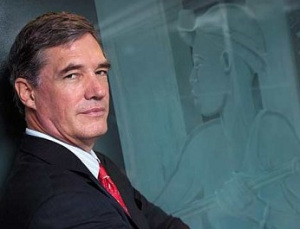We welcomed Brad Mills whose early career helped build BHP Billiton into the world’s largest mining company. After a stint as CEO of Lonmin plc, a global platinum producer, he started his own group of businesses that today employs over 1000 people and operates in six countries worldwide. Brad was once before a guest leader with Middleground when in 2009-2010 we launched the Strategic Leaders’ Programme.
During this Conversation Space hosted by Elana Friedman, with pelting rain in the UK stopping some getting to the call, Brad in the US held a dialogue with members of our community from around the globe. Below is a brief précis, and at the foot of this blog you can access the full sound file. 
What are the challenges of our century facing leaders CEOs? (From Selamawit in Ethiopia)
Brad: To put this into context I describe myself as “a builder of businesses and organisations”. When we open up a closed mine or turn round a struggling business the impact can be quite inspirational for communities and families. But three big challenges I most worry about are these: 1. Speed of adaptation: people really fundamentally don’t like change! How do we help that process along and keep it from becoming chaotic? 2. Organisational alignment. How do we keep people aligned in their decision-making, for example spending their budgets in line with the mission not creeping towards individual interests. 3. Creativity vs disciplined execution – at times we really need either the engineering brain or the art brain, and the other one creates difficulties. I spent a lot of my time on these three challenges, reducing complex things and keeping them as simple as possible.
Do you see moves by big companies from Corporate Social Responsibility into becoming more fundamentally socially oriented? (From Ian in Vietnam)
Brad: With corporations becoming so huge like Google, Facebook and ExxonMobil become huge and bigger than many governments both become the bad guy so who are the heroes now? A football quarterback gets more positive media tension. There is a lot of doubt about a globalised world and what leadership is like. With so much information we find out that our big leaders are quite flawed. We look for more local inspiration and today’s real heroes are quite quiet – they are not seeking media attention but just to be making a difference. They are looking for satisfaction individually and recognition just from their circle of friends. So leadership is more distributed today than almost anytime I can remember. It takes more dialogue when people are sceptical like this to get to a place where they are comfortable aligning and committed to a future, and less into a leadership sales model. Today people are sceptical about being sold messages – they are looking more for a two-way relationship with the organisation. At the small end of town we have small enterprise, and individuals trying to make a difference but being somewhat abandoned by governments.
Elana: How similar is it in Mexico Pedro?
Pedro: Our new government that has been around for about a year is handling things very differently. There is more fiscal discipline that in a way has nurtured a new entrepreneurial environment that bring creativity from young people coming out of universities. But we have as a country not been able to get together different sectors of society: the intellectuals, the public and private sector.
I wonder if you have insights about speed of adaptation, how to keep everyone and everything moving together and stop it being chaotic? (From Kate in London)
Brad: What’s worked for us is a very short chain of command to be able to make immediate adjustments. I have sympathy for example about response time in England when people need help right now, not slow sign-offs from ten ministers and a response in a months’ time. The question is who steps in and gets things done? We’re struggling globally with how do I react faster, without squandering resources. At the individual level it is how do I take action without authority?
Now I want to be a little bit provocative! In situations like the flood in the UK, would it sometimes be good for leaders to test the waters, not step in too early and see who else actually steps up? (From Twalib in Kenya)
Brad: You’re stepping into the challenge of alignment. What emerges is usually quite bi-modal: does someone local come up with something helpful, or just something I really wish they had not done? We had this in the mine we have in South Chile when they had a big port strike that stopped everything for us, putting our business under threat…. (listen to sound file for full story).
As a leader, how do we engender both trust and accountability in our organisations? (Elana)
Brad: We try to be very transparent – we work on really sharing information and trusting that people will use that information responsibility. We tell everyone about the finances and what’s important about what you are doing. Every day people in our organisation make individual decisions about how to spend money and we need to trust a lot of people to make a lot of good decisions. It is about getting good information flowing in both directions. But part of it is trust but verify! As CEO absolutely I trust you but I also expect you to do what you said you would do, and your actions are hugely more important than your words. If alignment is there and you demonstrated that then the leeway is very very large!
Conversation Space held 12 February 2014
Our next Conversation Space takes place 4 April 2014 with Jerry Muandinhohambo, former CEO of MVA. Look out for the invitation in your email, or register by email.